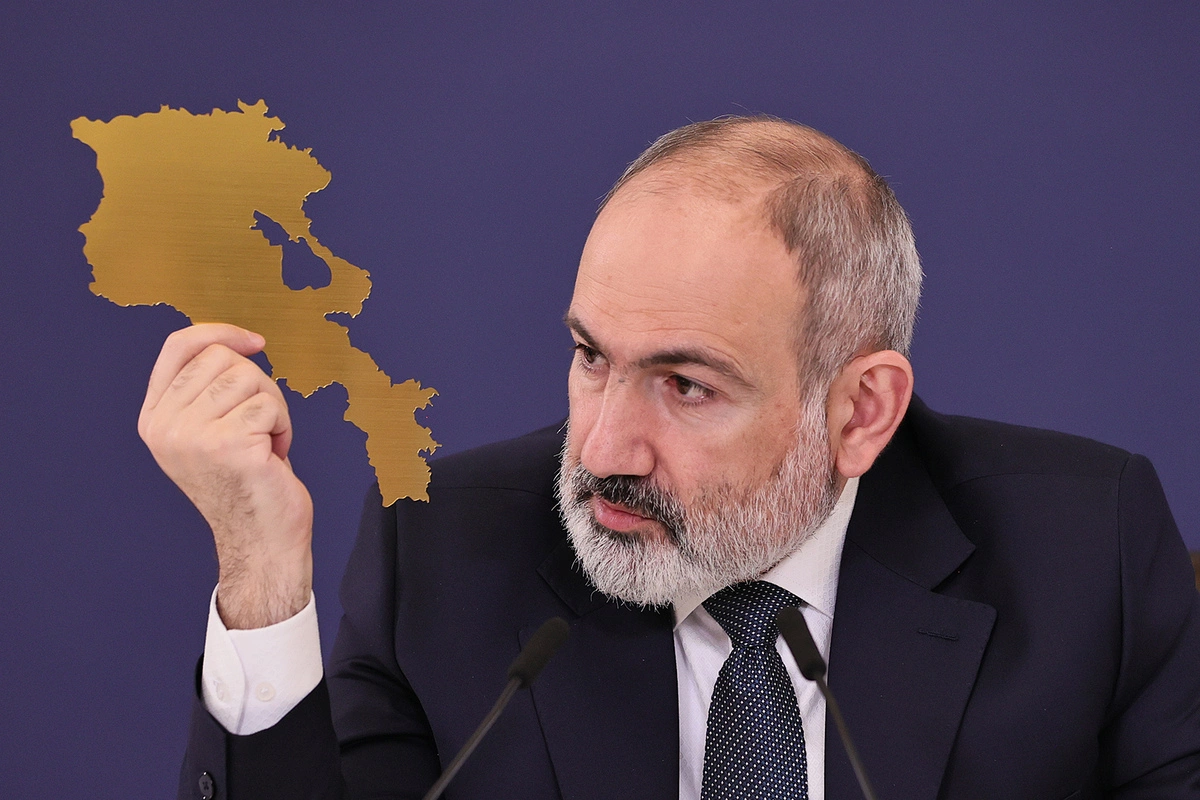
Last weekend, Azerbaijan’s Deputy Prime Minister, Shahin Mustafayev, called for the immediate return of those non-enclave villages controlled by Yerevan in the Gazakh region of Azerbaijan. On Tuesday, Armenian Prime Minister Nikol Pashinyan addressed the issue during a live press conference.
Image: primeminister.am
It was almost comical at first but also unexpectedly symbolic. Known for his trademark populism and oratory skills honed to resonate with the masses, it was perhaps the most effective way for Armenia’s Prime Minister, Nikol Pashinyan, to illustrate to the population the actual borders of their country. Holding a golden cutout map of Armenia to one side and, at times, a minuscule representation of the tiny Armenian enclave of Artsvashen in Azerbaijan to the other, his live press conference on 12 March was direct and to the point.
For decades, many Armenians have viewed the country as encompassing not only the now-defunct Nagorno Karabakh Autonomous Oblast (NKAO) but also the seven surrounding regions of Azerbaijan proper. In early 2020, Pashinyan even included the same irredentist map of a territorial area that had been taken back or returned during and immediately after the 44-day war with Azerbaijan later that same year. In September, the previously de facto but unrecognized Karabakh political entity dissolved itself following a military operation to disarm the local militia.
The situation has dramatically changed since and the press conference hinted at what might happen next in the complicated process of demarcating and delimiting the shared border. The press conference came just two days after Baku demanded the immediate return of four non-enclave Azerbaijani villages situated in its Gazakh region bordering Armenia that were occupied in the early 1990s. Previously, the focus had been on enclaves—territorial areas of both republics physically situated within and surrounded by the other.
On the other hand, non-enclave villages are simply those part of a country occupied by another. In his press conference, Pashinyan finally acknowledged that they are not part of the Republic of Armenia and cast some clarity on the issue.
Not only did the press conference come just three days after Azerbaijani Deputy Prime Minister Shahin Mustafayev stated that they should be returned immediately, but also five days after the seventh meeting of the two border commissions took place on 7 March on the Tavush-Gazakh border. It was the seventh such meeting since May 2022, first on the Armenia-Nakhchivan border and then in Moscow and Brussels before all subsequent meetings were held on the Tavush-Gazakh section of the border itself.
Four Azerbaijani enclaves within Armenia and the issue of Artsvashen in Azerbaijan would be resolved within the border commission meetings, but another four, the non-enclaves of Baghanis Ayrim, Ashagi Askipara, Kheyrimli, and Gizilhajili, should be returned immediately. The mention of these villages should not come as a surprise to anyone. They have been constantly raised over the past three years since the 2020 war. Indeed, a draft version of the 9 November trilateral ceasefire statement was inadvertently posted on the Kremlin website before it was quickly removed.
The reaction in Armenia so far appears muted, with only the opposition claiming that such a development would inevitably lead to a new war, though it is perhaps more likely that if they are not returned, then Baku could simply advance to retake them, arguing that they are internationally recognized as part of Azerbaijan. They also charge that Armenia’s “main road” to Georgia would isolate the country further. However, it would be more correct to state that it is a road connecting the eastern part of the Tavush region of Armenia to its northern neighbour.
Instead, the main road to Georgia passes through Alaverdi, Vanadzor, and Dilijan and is more adequately distanced from the Tavush-Gazakh border. Yerevan has also been working on constructing its North-South Corridor since 2009 that would connect its border crossing with Iran in Southern Armenia with the Bavra-Ninotsminda crossing on its border with Georgia to the north.
What might cause an issue is when the villages in Gazakh should be returned—before or during the actual physical process of border demarcation and delimitation starts. However, it is possibly telling that Pashinyan has already stated that this work could first take place on the Tavush-Gazakh border. Opposition concerns over the gas pipeline that runs close to Gazakh are a little more valid. Opposition concerns over the gas pipeline that runs close to Gazakh is a little more valid, but that has been the case for three decades now and has always been within range for Azerbaijan. That it hasn’t been is probably more because it is owned by Russia’s Gazprom.
Unlike Kelbajar, Lachin, Qubadli, and Zangilan, Armenia’s Tavush and Azerbaijan’s Gazakh regions have been a Line of Contact (Loc) between the sides for three decades. Moreover, as the Armenian Prime Minister also declared, both the gas pipeline and the less commonly used road that runs parallel to the Armenia-Azerbaijan border can always be easily re-routed where it momentarily runs through it.
"In the near future, we must take action, and where, for example, our communications are beyond our borders, we must reconstruct our communications in those areas so that all communications of Armenia pass through the de jure territory of Armenia," he noted. According to some unconfirmed reports, that process has already started, and Pashinyan has also said he will visit the area in question to address any concerns of the local community.
Share on social media